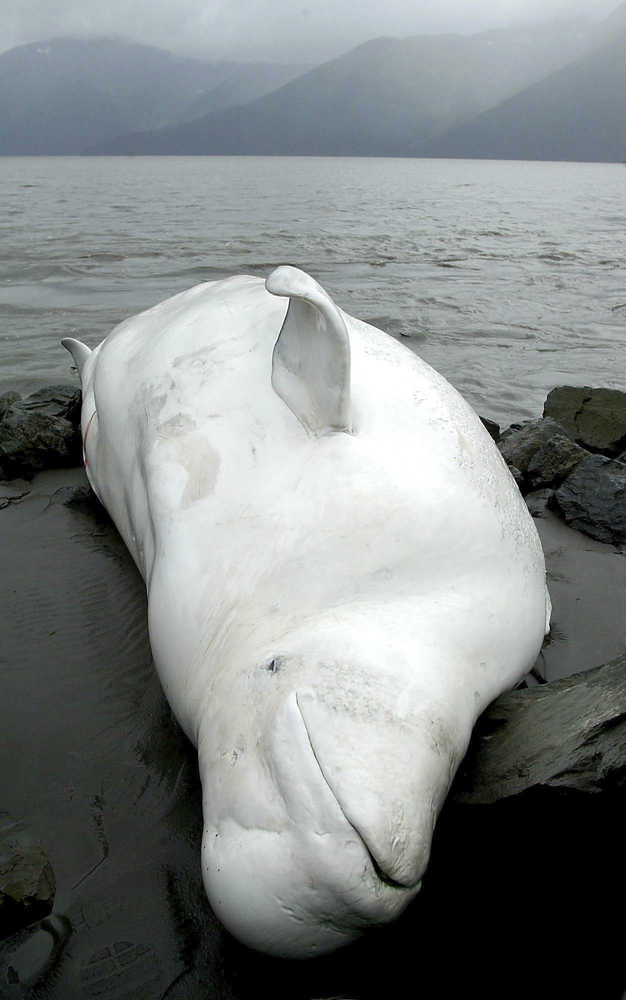ANCHORAGE — A federal plan for the recovery of an endangered Alaska beluga whale calls for a reduction in threats of high concern while scientists try to pinpoint what has kept the population from growing.
The National Oceanic and Atmospheric Administration on Wednesday announced its recovery plan for Cook Inlet beluga whales, a population listed as endangered since 2008.
NOAA’s National Marine Fisheries Service acknowledges it does not know why the population hasn’t bounced back. In the absence of an answer, the agency will focus on research and potential threats, such as noise and the cumulative effects of “multiple stressors.”
“Until we know which threats are limiting this species’ recovery, the strategy of this recovery plan is to focus recovery efforts on threats identified as of medium or high relative concern,” the agency said.
The state of Alaska fought the endangered species listing of Cook Inlet belugas eight years ago and took issue with the recovery plan. Division of Wildlife Conservation director Bruce Dale in a statement said it contains untenable recovery criteria that will limit acceptance by interested parties and extend hurdles to development.
“The most critical action for recovering the Cook Inlet belugas will be to determine why the population isn’t growing,” Dale said. “The threats limiting recovery are unknown.”
A 1979 survey counted nearly 1,300 beluga whales. A 2014 survey estimated just 340 and a population continuing to trend downward.
The recovery plan calls for an upgrade to “threatened” status when the population reaches 520 animals and delisting when there are 780. Dale took issue with those targets.
“These demographic criteria are problematic because the number of animals in a population is not necessarily an indication of the risk of extinction,” Dale said. The plan includes threats-based recovery criteria that cannot be measured and are impossible to meet, he said.
Cook Inlet belugas are one of five beluga populations in U.S. waters. Cook Inlet stretches 180 miles from Anchorage to the Gulf of Alaska and the fisheries service considers 1,300 animals to be its carrying capacity.
The whales turn white as adults and can reach 15 feet long. They feed on salmon, smaller fish, crab, shrimp, squid and clams and in late summer can be spotted from highways leading from Anchorage, chasing salmon schooled at stream mouths.
The Cook Inlet beluga population dwindled steadily through the 1980s and early ‘90s. The decline accelerated between 1994 and 1998 when Alaska Natives harvested nearly half the remaining 650 whales in only four years. Subsistence hunting ended in 1999.
Federal officials initially figured that controlling subsistence hunting would allow the population to recover. When it did not, they declared belugas endangered in 2008.
The agency identified 10 potential threats to belugas. Of highest concern are catastrophic events, such as natural disasters or oil spills; cumulative effects of multiple stressors; and noise.
Threats of medium concern include disease agents, such as blooms of harmful algae, loss of habitat, a reduction in prey and unauthorized killing.
Threats of relatively low concern include pollution, predation and subsistence hunting.
The agency estimated recovery could take at least 50 years, which translates into two generations of whales.
Karla Dutton, Alaska program director for Defenders of Wildlife, said the recovery plan was overdue but welcome.
“We call on National Marine Fisheries Service to properly fund in a timely manner the science needed to further understand and address these threats so we can work together to recover this iconic Cook Inlet species,” she said by email.

